AirCare trio is cornerstone of UMMC’s medical air transport
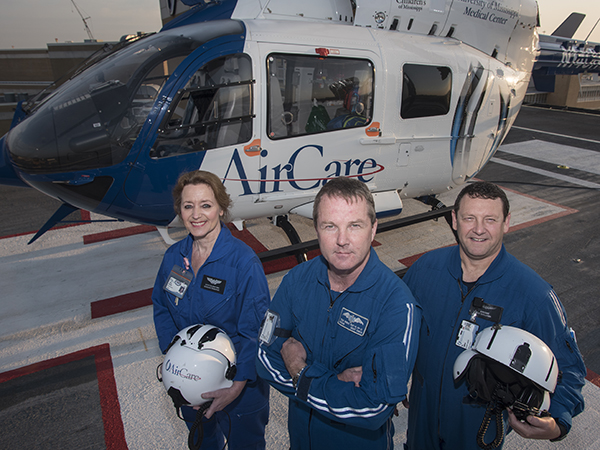
Just three people at the University of Mississippi Medical Center can say they've bested Donna Norris' 20-year anniversary with AirCare.
Bo Sullivan, Cathy Delaney and Todd Perry are the only original flight nurses still on the staff of AirCare since it made its maiden flight in February 1996. The state's most advanced medical helicopter transport over time has cared for more than 18,000 patients and flown more than 2 million miles.
“Their experience cannot be duplicated, personally or professionally,” said Norris, 53, a registered nurse who flew on AirCare for almost two decades before becoming clinical director of Mississippi Med-Com. “They are the cornerstones of the team.”
Like Norris, Sullivan is experiencing a milestone: He's retiring as a lieutenant colonel with the Mississippi Air National Guard after 33 years as a flight nurse. But, he's not leaving his job at UMMC. He and Perry are 52.
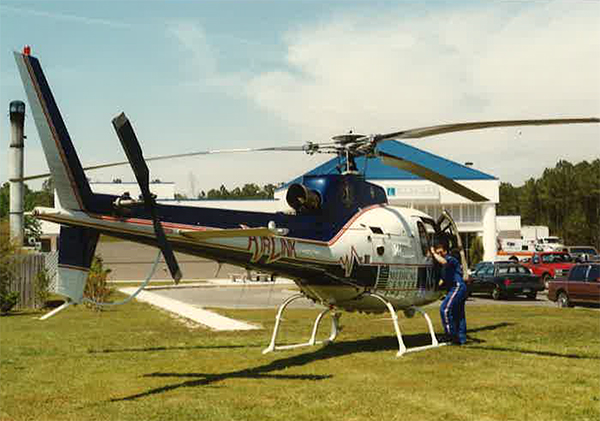
“It speaks volumes to the working environment and team atmosphere for them to have 20-plus years, and others to have 10-plus, or 12-plus,” said former AirCare paramedic Dr. Damon Darsey, associate professor of emergency medicine and medical director of the Mississippi Center for Emergency Services.
“Bo and I are both eligible for retirement, but it's hard to say goodbye and give this up,” said Delaney, 54, a neonatal transport nurse who makes her home in Madison. “I have no plans to retire. I don't want to. The University is literally part of my life.”
Delaney in 1985 started her career at UMMC as a NICU nurse, and in 1993 became a neonatal transport nurse. Before AirCare, she said, “we went by ground in state, or in small planes. If we had to transport heart babies out of state, we went by Lear jet. Medical jets for hire were very, very expensive.”
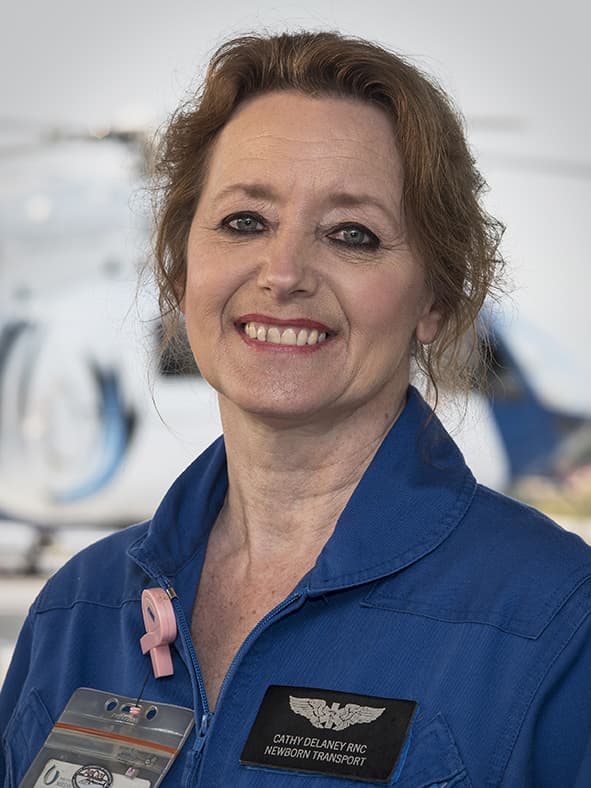
Her memories of AirCare transports - the good and the bad - remain vivid. “There are some parents who stay in touch with you through the years. I have one mother who still sees me, and brings her child up. She said we are her baby's guardian angels.”
She will never forget, for example, the AirCare flight a decade ago to transport a baby from north Mississippi who “was literally dying. We had to resuscitate her. We had to hand-bag her in the air all the way to UMMC,” Delaney said. “We brought her back to our ICU and continued her care, and she went home and is thriving.”
AirCare has the state's only neonatal-trained medical air transport team. Delaney has seen many advancements in care since she began flying, including “nitric oxide therapy for babies with low oxygen levels in their blood who are having a hard time transitioning after birth. We have things we can offer that the knowledge just wasn't there back then.”
AirCare's fleet, with bases in Jackson, Columbus and Meridian, is equipped with the most advanced flight instrumentation, meaning it can fly in some of the most extreme weather conditions. Delaney remembers the night not long before AirCare got that technology when the copter made an emergency landing, with very little visibility, in a field between Tupelo and Jackson with a baby on board.
It was the only time she questioned her career choice.
“That was the worst flight of my life,” Delaney said. “Bo was very reassuring to the pilot. He put his hand on his shoulder. He was a huge factor in saving lives that night.”
Sullivan saw plenty of carnage during his seven deployments to the Middle East with the Guard. Some days with AirCare, those transported are just as traumatically injured. “It was bittersweet,” Sullivan, a Richland resident, said of his March 1 retirement from the Guard. “I've been doing it all of my adult life.”
But one thing he never worried about on trips aboard a cavernous C-130 military transport plane was a duck strike. One memorable bird blunder happed a few years ago on a flight from Meridian to Jackson.
“You've got a seven-pound duck and a copter moving at 140 miles per hour,” Perry said. “The windshield is Plexiglas. The duck is going to make a hole in it. It came through the window and cut the pilot up.”
No AirCare copter has crashed, despite circumstances that could end in tragedy for less experienced pilots and crew. “We've been fortunate in 21 years to have no reportable incidents,” said Perry, who lives in Gluckstadt.
AirCare is “a mini-trauma room in the air,” Sullivan said. “We don't just go and pick patients up. We assess what's wrong with them, and we take care of them. Some hospitals have limited resources. The doctors there don't see the advanced care that we do so frequently.”
AirCare nurses and critical-care paramedics seize every technological advance in care to enhance their ability to save patients. “We add them to our arsenal,” Sullivan said. Two debuted over the last two years: Kcentra, a drug used to reverse the effects of blood thinners; and a portable laboratory that allows “point of care” bloodwork at the scene of a wreck or disaster.
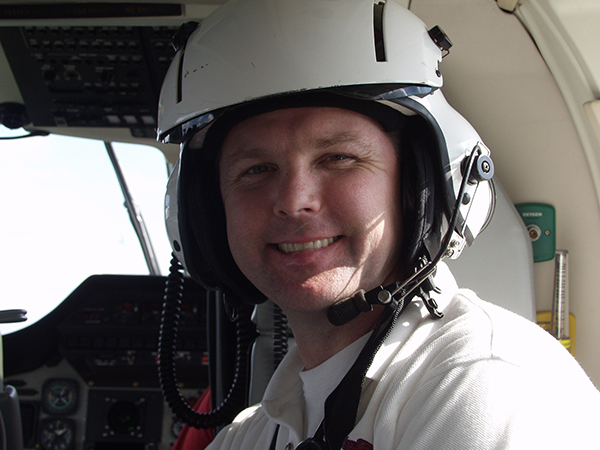
AirCare is the only medical transport in the state that carries blood on board. “We gave him all the blood we had. We gave him Kcentra,” Perry said. “His heart arrested. We did CPR in flight. We got him to the ED, and they immediately took him into surgery.”
The next day, Perry said, the patient was sitting up and talking in the ICU. “He literally had died in flight,” Perry said. “Without our intervention, he would not have made it.”
The versatility of AirCare's crew never ceases to wonder. “How did they survive? You see the little miracles,” Sullivan said. And then, there are the times when some patients survive, but others from the same calamity don't.
Late last year, Perry was driving home from work on I-55 North. A man driving the wrong way on the interstate crashed head-on into another vehicle. Perry came up on it just seconds after it happened. He jumped out of his vehicle and ran to the two victims, and summoned AirCare. Sullivan was on duty.
“I made two trips that night. I landed in the middle of the interstate twice,” Sullivan said. Each round-trip to the Medical Center took just 15 minutes. And when the copter landed the first time on the UMMC helipad, Sullivan let someone else roll the patient to the ER.
“I stayed on the helicopter,” he said. “I flew back to help Todd.”
Perry, Delaney and Sullivan treat patients the same. Whether or not the sick person has the means to pay for transport never enters their minds. “Our patients reflect the stroke belt - heart attack, hypertension, prematurity and the lack of prenatal care in newborns, in addition to trauma,” Norris said. “Cathy and I have transported some of the sickest babies known to man.”
“We're operating the highest-level clinical care aviation group in a state that has many health care challenges,” Darsey said. “We're constantly restrained with weight, space, costs and doing more with less weight and less cost. We're pushing the envelope to go to a higher level to be better, faster, leaner, meaner, and to bring what we have to the bedside of patients.”
They stay on the cutting edge of improvements that make the difference between life and death. 'We are constantly moving forward. Other programs get complacent,” Sullivan said. “We want the newer and brighter things in medicine. We can get so many things accomplished on a 20-minute flight.”
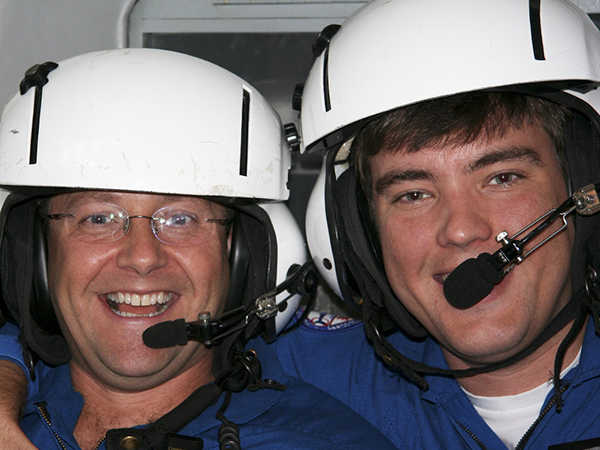
AirCare flight crew members don't put aside their emotions in a job that requires quick decisions and sharp focus. “Todd and I have talked to families and shed tears with them,” Sullivan said.
“We cross every t and dot every i, but sometimes, it's just in God's hands. We put forth the best effort we can,” Perry said.
Sullivan can't imagine doing anything but saving lives, even if it means flying in dicey weather or landing in the middle of a major interstate. It's why he's not going anywhere after 29 years at the Medical Center. The same holds true for Perry, who's been at UMMC 21 years.
“I have a 3-year-old. I'll never be able to retire,” Perry joked.
“It's our job. It's what we're good at. It's part of us,” Sullivan said. “We're going into the fire.”


